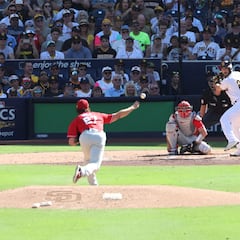Why are the Dodgers unable to live up to October expectations?
The Dodgers double down in the face of increased criticism of their overly-analytical approach and advertise for a new Baseball Strategist


The Los Angeles Dodgers won more baseball games than anyone else this season. With a franchise-record 111 wins, they were seven wins ahead of their nearest competitor. Which made their being knocked out of the playoffs by the San Diego Padres doubly cruel.
The Dodgers are the marquee west coast team, ahead of the Angels, the Giants, and the Padres. They enjoy the deepest pockets, the longest pedigree, and the greatest fan support in California, a fact that Dodger fans never shy away from pointing out.
When faced with the prospect of meeting a Padres team with an 89-win season, the Dodgers faithful saw this as no more than a small speed bump on their way to the World Series. After all, the best team in baseball is the one with the best record, right? And the best team should win the World Series, shouldn’t they?
Losing to a rival is always difficult, worse still when they are a neighboring city, but to lose three out of four games is humiliating. So when the Dodgers were so unceremoniously sent packing, the fanbase was awash with incredulity. Calls began to change the playoff system, somehow; details of exactly how are thin on the ground. But the gist of the story is always the same. Do something, anything, that would guarantee that the team with the most wins can stay in the playoffs, even if they lose.
The Dodgers have been eliminated from the postseason. pic.twitter.com/kVsUbZFxHL
— ESPN (@espn) October 16, 2022
Los Angeles have won over 100 games per season in four of the last five full seasons, ignoring the covid-shortened 2020. And they have finished in first or second place every year for a decade. They have built a program designed around consistently winning. Which masks an uncomfortable truth. That very system predisposes the Dodgers to lose in October.
Analytics saved baseball. And is killing it.
It has become fashionable to hate analytics. Or love it. It divides opinion in baseball and the two camps see very little common ground. In principle, analytics is a great tool.
In Michael Lewis’ best selling book Moneyball, and to a greater extent in the film made from it, the focus was placed on Billy Beane and the Oakland A’s. But the hero of the story was analytics itself.
Postured as a classic western, or medieval morality play, the under-paid, under-funded underdog hero used statistics and numbers to turn the tables on baseball itself, and the adherents to heart-over-head baseball were cast as the black-hat wearing bad guys. And while the good guys didn’t win at the end, they started a revolution that would eventually sweep everything that came before it away.
The truth, of course, is a little more nuanced.
Analytics, in its basic concept, is simply the collation of data. It doesn’t add or subtract from what happens, but simply reports it. Prior to the early part of the 21st century, the analytics in baseball were rudimentary. No team gave the number-crunchers a seat on the adult’s table.
And then the world shifted. Over the next decade, the analytics boffins went from struggling to get a seat, to the head of the table, often placed above every other part of the organization. No longer a lone voice in the wilderness, they were running the show.
I still can’t believe the 111 win Dodgers (+334 RD) got eliminated in four games in the first round. 😂🤷♂️ pic.twitter.com/bm14s4DtRL
— Thomas Carrieri (@Thomas_Carrieri) October 20, 2022
And based on their suggestions, the Dodgers entered into an unprecedented run of success. With a born-again believer in Dave Roberts as the coach, the blues became the dominant force in the National League. So why can’t they extend that dominance into October?
The problem with the sample size
At its heart, analytics is a numbers game. Trading off low-yield items, such as base hits, stolen bases, or bunts, for higher-yield products, like home runs, is the meat and potatoes of the analytics department. They base all of their calculations on the concept that the short-term loss would give way to a long-term win. And generally, they are correct.
Numbers don’t tell you what will happen. They tell you what has happened before. And from that information, you can predict with a good degree of certainty what is likely to happen in the future. The problem is that when you are working the percentages, you need a very large sample size before you can see the results.
When it comes to winning a single game, or a best of three, five, or seven, the sample size is simply too small for the predictions to bear fruit. Over the course of a 167-game season, the Dodgers can win two-thirds. But when it comes to an individual series of games, it becomes a crap-shoot.
By devoting their energies to playing analytics baseball, the Dodgers have guaranteed that they will be in the playoffs for the foreseeable future. But when it comes to winning in the playoffs, their chances are no better than 50/50. And they are only that high if they face a similarly-minded team. When they face a team who have eschewed analytics in favor of a more feel-based approach to the game, the Dodgers effectively have no chance.
Dodgers: Andrew Friedman Says No Staff Changes Coming in Wake of NLDS Debacle
— Dodgers Nation (@DodgersNation) October 20, 2022
More details here:https://t.co/x3rUDDKvYW
The biggest counter foil to the Dodgers approach is the Houston Astros. They run the numbers, and they use them when they can. But it is not the basis of their game plan. Instead, they rely on the knowledge and experience of Dusty Baker, a guy who has an uncanny knack for feeling what the right move should be. Not unlike Tommy Lasorda. All heart.
Dave Roberts has a good feel for the game, of that there is no doubt. Sometimes you catch a glimmer of it. But he has chosen to bury that feel under the weight of the stats that he has been handed. Pulling Clayton Kershaw from a seventh-inning perfect game bid simply because he is on 80 pitches may make sense in the long term. It will definitely keep Kershaw’s arm fresh. I would like to believe that Roberts would not have made the same decision were that situation in October rather than April. But based on Roberts other managerial moves, I fear that he would have.
Related stories
Now, just a week after that humiliating loss of three straight games to the Padres, fans have been screaming for the return of a Lasorda-like approach to baseball, one that doesn’t give a damn if it is the smart play, just so long as it is the right play. The kind of approach that would send Kirk Gibson hobbling up to the plate to pinch hit. In response, the Dodgers have doubled down on their analytics approach by advertising for a new Baseball Strategist. Analytics isn’t the problem, they say. The problem is the lack of even more analytics.
Dodgers Are Hiring for a Baseball Strategist… and It’s Not a Joke
— Dodgers Nation (@DodgersNation) October 20, 2022
More details here:https://t.co/0i3WsAsSxB
Winning games in the regular season is a ticket, earning you the right to play in the post season. Nothing more. A great team wins over 100 games. But to be the best, you have to win with everything on the line. You have to make the clutch hits, lay down the bunt, steal the base, and not simply wait for a home run ball to save you. Putting the ball in play kickstarts a chain reaction, where anything can happen. And until they can make that simple truth a part of their game plan, the Dodgers may be a great team, but they will not be champions.

